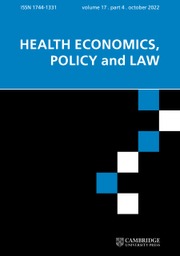It would be wrong to introduce ourselves as the incoming Editors of Health Economics, Policy and Law (HEPL) without first expressing gratitude to Adam Oliver. To Adam, thank you for your steadfast commitment to this journal, and for pushing this ‘gigantic wooden wheel’ with scientific integrity and innovative curiosity. In a world where things are often encouraged to be this or that, you built a platform of this and that – allowing readers to access multidisciplinary ideas and thoughts. We know for sure that many of the HEPL readers join us in saying this big ‘thank you!’ for all the work you have done to make HEPL into a thriving scientific journal, offering numerous opportunities to both upcoming and established researchers to discuss and present their work.
As the new Editors, we will embrace this multidisciplinary spirit and aim to work towards strengthening the journal's impact. HEPL will continue to be the place of debate and where knowledge can evolve and shape policy and practice. With our own personal and professional backgrounds that include, amongst other areas, health policy, regulation, global health, and data sciences, we believe in critical policy analysis as well as the opportunities of positive change arising from rigorous, high-quality health and social care research.
HEPL has been at the forefront of many important debates in the past, including through the HEPL blog series on the COVID-19 pandemic led by Adam. Combining timely insights from scholars based across the world has helped develop a comparative perspective on different policy responses, arguably during one of the most uncertain times in recent history. Learning from one another, the good and the bad, understanding causes and impacts, and how policy can be shaped to ensure systems deliver to the best of their ability, will be driving us as we embrace this new chapter.
We want HEPL to be a journal with global reach and this issue is reflective of this objective. This first issue of 2024 presents important insights on access to care, from primary care in Ireland and China, to spillovers of health insurance on fertility in the United States, and the effects of information and communication technologies on early child health across 51 African countries. Democratising knowledge on challenges and solutions from across the world, whether it relates to politics, workforce, or financing, HEPL will continue to be an outlet for critical and evidence-driven exchange.
Fostering a global community who believes in the multidisciplinary approach to addressing health and social care issues will be at the centre of our work. This will include the alignment with the European Health Policy Group, but also an expansion of partnerships with new and existing networks like the one with Columbia University, institutions, academics, policymakers, and professional organisations. Publishing broad and diverse perspectives, and to empower scholars from various academic scientific and in different stages of their academic careers will form part of our journal strategy.
We are grateful to Cambridge University Press and the selection committee for entrusting us with this new role. It is a humbling experience to follow in the footsteps of Adam, but we are determined to grow the strengths of this journal further. But importantly, the continued success will depend on the support and contributions of those who have engaged with HEPL over the past 17 years, both the board and authors. Much like the multidisciplinary need to deliver impactful policy changes, it will take the collective contributions from across the fields of health economics, policy, and law to deliver a journal that both explains histories to understand current times, and that helps to shed new lights on contemporary and (expected) future challenges in health care. HEPL always has been on top of ‘healthcare things’ and will continue to do so. A happy new year to you all!



